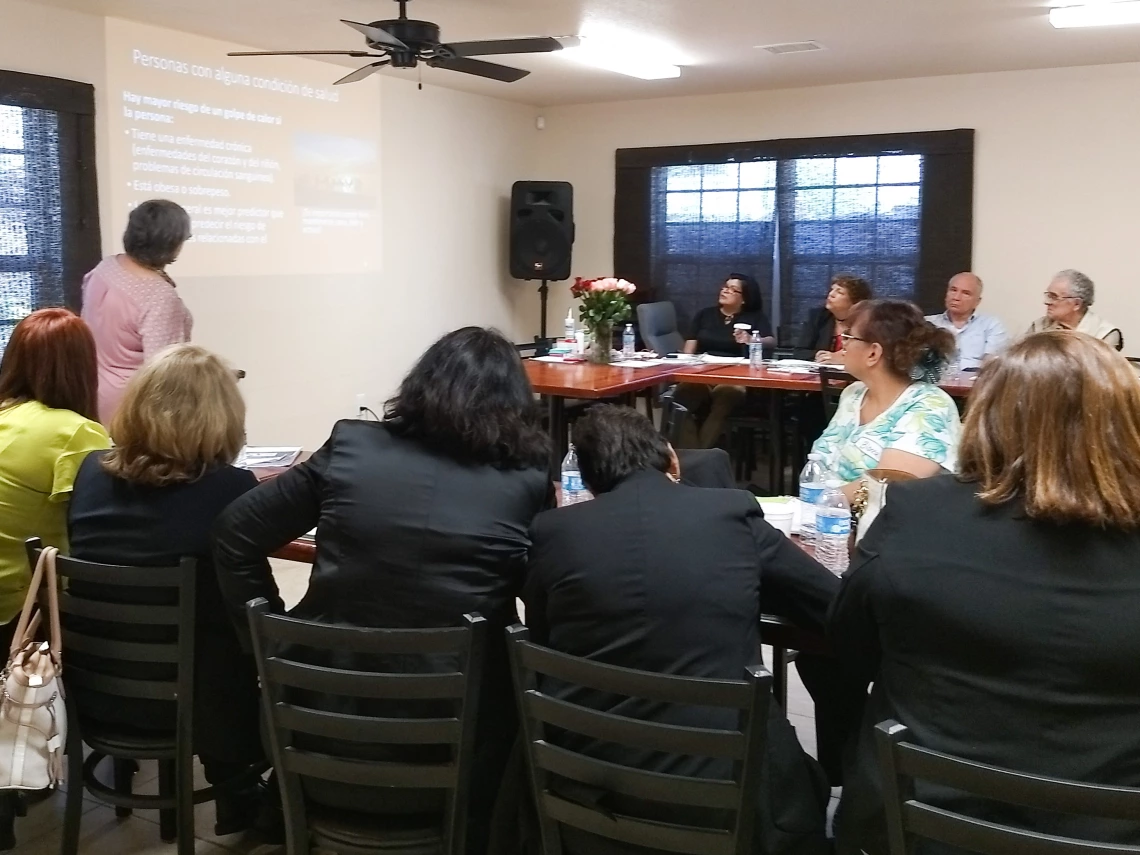Summer is Here and That Means Extreme Heat Preparation!

An update from El Paso, Texas: Hot Spots for Heat Resilience in Border Cities, a Haury Program Seed grant
Extreme heat is a risk to public health, especially in the desert region along the U.S.-Mexico border. Heat risk increases with expanding urban heat islands and increasing temperatures. The Hot Spots project team prepared for this summer by developing a detailed bilingual curriculum which identifies and addresses heat-related health risks for border residents and expectant mothers.
In April 2018, the Hot Spots project team convened two trainings in El Paso, using the heat risk curriculum, for border neighborhood community health workers, known as promotoras, and maternal health professionals, such as doulas and midwives. 40 health workers attended the lively and interactive trainings, which focused on information about vulnerable populations who often lack basic public services or access to bilingual information, expectant mothers at risk for pre-term delivery and infant mortality. Many were unaware of risk factors, such as the magnitude of high temperatures in the region as well as how high temperatures and dehydration can exacerbate other health risks, such as respiratory or cardiovascular ailments, causing life-threatening situations.
The Hot Spots team developed colorful, easy-to-read, bilingual handouts and informational materials to raise interest and educate. Refrigerator magnets, adorned with beat the heat health tips and health emergency phone numbers, and hydration charts showing shades of urine color from healthy to extreme dehydration were big hits with participants. Health workers are now making in-home visits in their communities with these materials, and at the end of the summer, they will share their experiences and lessons learned with the team in order to improve future outreach.
Next steps in the Hot Spots project include implementation of low-cost home improvements to reduce exposure to heat for a selection of demonstration homes in El Paso area colonias. The team will also build a border region heat-health learning network. The network will provide mutual support and knowledge exchanges among partner projects in Arizona and other border states—to share experiences in the hot spots, foster community, and prevent heat-related illnesses and deaths.
The Hot Spots project team includes AYUDA (environmental protection advocates for low-income residents of colonias), Red de Promotoras Paso del Norte (promotoras), maternal health professionals, and researchers from the University of Arizona, University of Texas at El Paso, and University of California, San Diego.
Download the curriculum and printable PDF version of the information material, it's free. Illustrator versions of the outreach materials which allows you to edit emergency information relevant for your city are available for you under request.
Listen to Dr. Gregg Garfin, UA Institute of the Environment, Rachel Curtis, Labor Doula and Certified Counselor at The Desert Doula, and Esther Olivares, Red de Promotoras Paso Del Norte talking with Mrs. Green (Gina Murphy Darling) about the project’s goals including the creation of a heat health risk training program and how they plan to provide low-cost interventions in El Paso, Texas. The podcast will be airing on July 31, 2018, on Mrs. Green World Podcasts website.
For more information about the project, please contact Gregg Garfin, Deputy Director for Science Translation and Outreach, Institute of the Environment (gmgarfin@email.arizona.edu).
